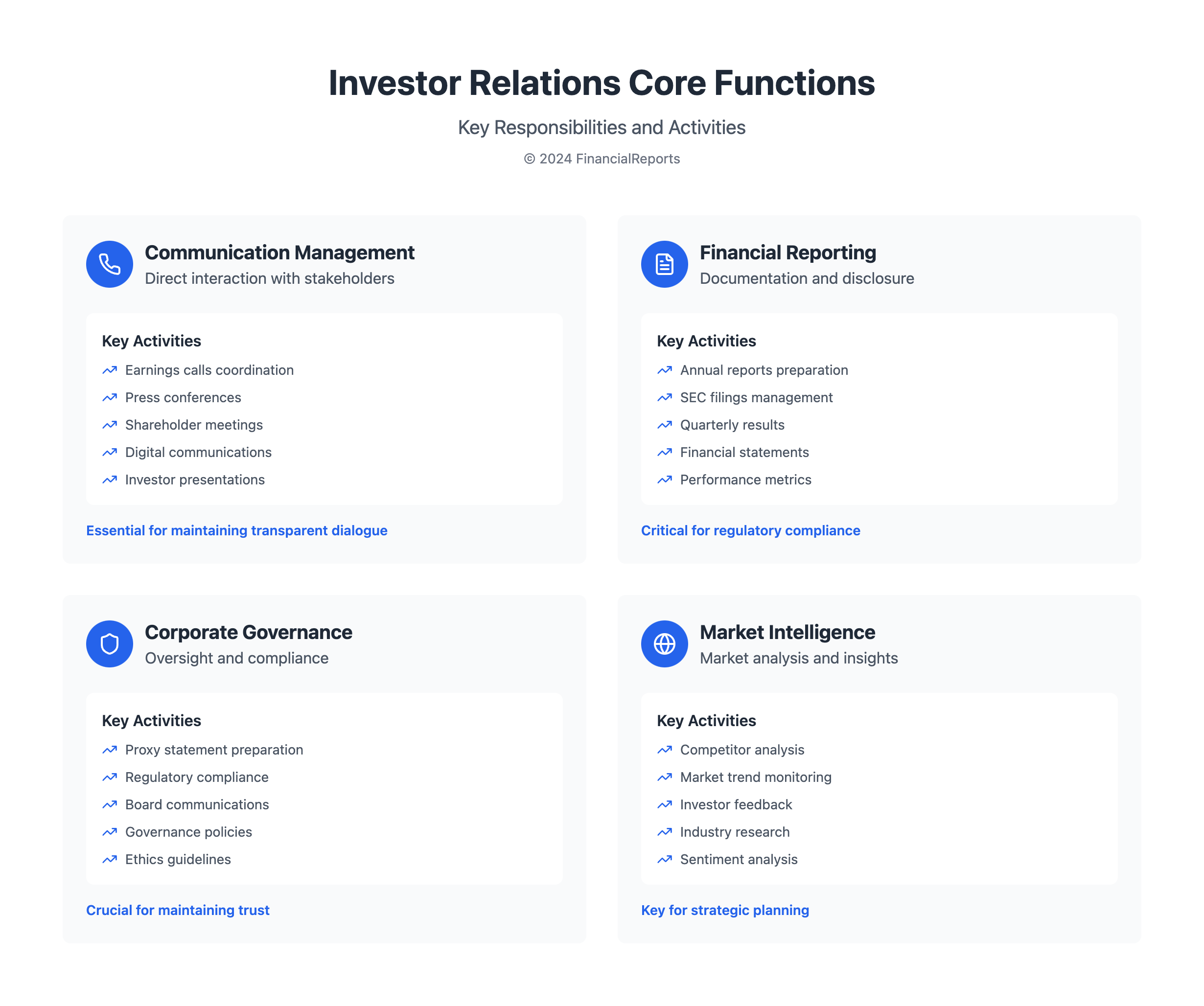Top Strategies for Effective Investor Relations Management
Investor relations bridges the gap between companies and their investors by delivering transparent, timely financial information. This article discusses key strategies for effective management, the role of investor relations in corporate governance, and how transparency can boost investor confidence.
Key Takeaways
-
Investor relations serve as a strategic asset that enhances shareholder confidence and contributes to a company’s overall success through effective communication and transparency.
-
Key functions of investor relations teams include organizing shareholder meetings, conducting earnings calls, and managing compliance with regulatory requirements, which are vital during financial crises.
-
Annual reports and proxy statements are essential tools for fostering transparency and accountability, enabling informed shareholder decision-making while supporting corporate governance practices.
Understanding Investor Relations
Investor relations transcend being a mere corporate function; they represent a strategic asset with a profound impact on a company’s success. Fundamentally, investor relations supply investors with critical corporate information for making informed decisions. This division plays a pivotal role in ensuring fair trading of a company’s stock by offering timely and accurate financial data.
The primary goal of investor relations is to build and sustain investor confidence. Delivering regular updates and financial statements assists investors in grasping a company’s financial health and strategic direction. This transparency enhances investor trust and maximizes shareholder value by offering a comprehensive view of business strategy and expansion objectives.
Effective investor relations integrate various functions, including finance, communication, marketing, and compliance with securities laws. This multidisciplinary approach ensures that investor relations professionals can manage relationships and streamline communication between a company and its investors. This approach fosters long-term relationships with potential investors, especially crucial for companies planning to go public.
Key Functions of Investor Relations Teams
Investor relations teams are the backbone of a company’s communication with its investors. Their varied and multifaceted responsibilities include:
-
Coordinating shareholder meetings
-
Organizing press conferences
-
Releasing financial data
-
Handling SEC filings
-
Managing financial analyst briefings to ensure clear and effective communication of financial information.
In times of financial crises, the role of investor relations becomes even more critical. Their role includes managing the public relations aspect, maintaining investor confidence, and mitigating potential damage to the company’s reputation.
For example, companies like T. Rowe Price conduct quarterly earnings calls to discuss financial results, providing a platform for transparent communication with institutional investors.

Importance of Annual Reports and Proxy Statements
Annual reports and proxy statements are indispensable tools in investor relations. Since their introduction in 2001, these documents have provided investors with comprehensive financial information and insights into corporate governance practices. Providing a detailed overview of a company’s financial performance, the annual report enables investors to make informed decisions and mitigate potential risks.
Proxy statements, on the other hand, are essential for providing shareholders with the necessary information to vote on significant company matters. These documents must disclose executive salaries, performance metrics, and potential conflicts of interest, ensuring transparency and accountability. The SEC mandates that corporations file proxy statements before annual or special shareholder meetings, further emphasizing their importance in corporate governance.
Contextualizing financial data, annual reports and proxy statements aid investors in understanding the company’s journey, promoting informed decision-making. This transparency not only enhances investor confidence but also supports the overall corporate governance framework, fostering a culture of ethical practices and accountability.
Enhancing Shareholder Confidence Through Transparency
Transparency is the cornerstone of effective investor relations. Timely and precise information about a company’s financial health and strategic direction is crucial for maintaining and enhancing shareholder confidence. Companies that are open about their financial challenges demonstrate accountability, which reinforces investor trust.
Regular updates, particularly via digital platforms, keep investors informed about key developments and foster a sense of community. Around 75% of investors prefer to receive updates digitally, highlighting the necessity for companies to adapt their communication strategies. Webinars and other two-way communication opportunities enable real-time interaction, further strengthening the bond between the company and its investors.
Effective investor relations also play a crucial role in crafting communication strategies that convey both opportunities and risks to investors. Consistent financial communication ensures that investors are well-informed and involved in addressing challenges, thereby enhancing collaboration and mutual trust.
The Role of Investor Relations in Corporate Governance
Investor relations are integral to corporate governance, acting as a bridge between shareholders and executive management. Facilitating effective communication and feedback, IR teams support the overall governance framework and help maintain regulatory compliance. This integration is crucial for ensuring ethical practices and fostering a culture of transparency within the company.
Proxy statements are a key component of this governance framework. They provide shareholders with detailed information about executive salaries, performance metrics, and potential conflicts of interest, ensuring that they can make informed voting decisions. The SEC requires this proxy statement to be filed before annual or special shareholder meetings, underscoring its importance in maintaining transparency and accountability.
Effective investor relations can significantly improve shareholder trust and enhance the company’s overall reputation. Preparing for the scrutiny and expectations of being publicly traded, IR teams help companies adhere to laws, regulations, and ethical standards, fundamental for proper corporate governance.
Utilizing Digital Tools for Effective Communication
In today’s digital age, utilizing electronic delivery and digital platforms is crucial for effective investor communication. Electronic delivery of shareholder information improves accessibility and speed, enabling investors to receive updates promptly and stay informed about key developments. This method not only improves efficiency but also aligns with the preferences of modern investors.
Digital tools also foster interactive communication between companies and investors, encouraging feedback and engagement. Online resources should be optimized for mobile devices, ensuring that investors can easily access information anytime, anywhere.
Leveraging these digital tools allows companies to create a more dynamic and responsive investor relations strategy, ultimately enhancing investor satisfaction and confidence.
Upcoming Events and Financial Results Presentations
Financial results presentations and upcoming events play a significant role in investor relations. These events provide a platform for companies to communicate their financial performance and strategic direction to investors. For instance, the T. Rowe Price Q3 2024 earnings call, scheduled for October 24, 2024, will offer valuable insights into the company’s financial health and future prospects.
Such presentations are crucial for maintaining transparency and keeping shareholders informed about the company’s performance. Regularly updating investors through these events enhances credibility and fosters trust and confidence among shareholders.
Press Releases and News Updates
Press releases and news updates are essential for keeping shareholders informed about significant developments that may affect their investment decisions. For example, T. Rowe Price recently reported total assets under management of $1.67 trillion and net outflows of $6.4 billion for November 2024. Timely press releases about such financial metrics help investors stay informed and make well-founded decisions.
Regular updates about market outlooks and preliminary financial results can also enhance investors’ understanding of the company’s performance. Maintaining a steady flow of news and updates ensures that shareholders stay up-to-date with the latest information, reinforcing investor confidence.
The Impact of Government Legislation on Investor Relations
Government legislation has significantly transformed investor relations practices, emphasizing the need for transparency and accountability. The Sarbanes-Oxley Act, for instance, has raised the standards for financial reporting, thereby strengthening the role of investor relations in corporate governance. This act mandates that publicly traded companies enhance their internal reporting and compliance mechanisms, ensuring greater transparency and ethical practices.
Similarly, the Dodd-Frank Wall Street Reform and Consumer Protection Act has mandated increased transparency in financial operations, preventing financial institutions from taking excessive risks. These legislative changes have heightened the importance of investor relations, making it essential for companies to maintain clear and open communication with their investors.
Overall, government legislation has underscored the significance of investor relations in ensuring accountability and clarity in corporate communications. Adhering to these regulatory requirements enhances a company’s reputation and fosters greater trust among investors.
Benefits of a Strong Investor Relations Division
A robust investor relations division offers numerous benefits, including increased access to capital markets and enhanced financing capabilities. Fostering relationships with investors enables companies to secure financing at lower costs and attract fresh capital. This enhanced liquidity can boost the demand for the company’s stock, ultimately benefiting shareholders.
Transparent financial practices and effective communication foster long-term relationships and mutual respect between companies and investors. Maintaining regular updates and clear communication, a strong IR division can significantly enhance a company’s reputation and investor confidence, contributing to overall success.

How Investor Relations Support Pre-IPO Activities
Investor relations play a vital role in supporting pre-IPO activities. Before a company goes public, the IR division assists in areas such as corporate governance, financial auditing, and communication with potential investors. This support is crucial for ensuring a smooth transition to a publicly traded company.
Pre-IPO companies often lack a dedicated investor relations department, placing the responsibility for communications on the CFO. Managing transparency and consistency during significant corporate events like IPOs, investor relations professionals help build investor trust and confidence, laying the foundation for future success.
Summary
Effective investor relations management is a cornerstone of corporate success. By providing timely and accurate financial information, fostering transparency, and ensuring compliance with regulatory requirements, investor relations professionals play a crucial role in building and sustaining investor confidence. A strong IR division can enhance a company’s reputation, attract fresh capital, and support long-term growth. As we’ve explored, the strategies and practices discussed here are essential for any company looking to thrive in today’s competitive financial markets.
Frequently Asked Questions
What is the primary goal of investor relations?
The primary goal of investor relations is to enhance and maintain investor confidence through the timely provision of accurate information regarding the company's financial status and strategic objectives. This fosters a transparent relationship between the company and its investors.
How do annual reports and proxy statements benefit investors?
Annual reports and proxy statements benefit investors by offering essential financial data and insights into corporate governance, enabling informed decision-making and risk mitigation. This comprehensive information is crucial for assessing the viability of investments.
Why is transparency important in investor relations?
Transparency is crucial in investor relations because it fosters shareholder confidence through accountability and ensures investors are well-informed about the company's financial status and challenges.
How has government legislation impacted investor relations?
Government legislation, such as the Sarbanes-Oxley and Dodd-Frank Acts, has significantly enhanced investor relations by enforcing stricter transparency and accountability requirements in financial reporting and operations. This has fostered greater trust and confidence among investors.
What role does investor relations play in pre-IPO activities?
Investor relations play a crucial role in pre-IPO activities by facilitating corporate governance, conducting financial audits, and effectively communicating with prospective investors, which ensures a seamless transition to becoming a publicly traded entity.